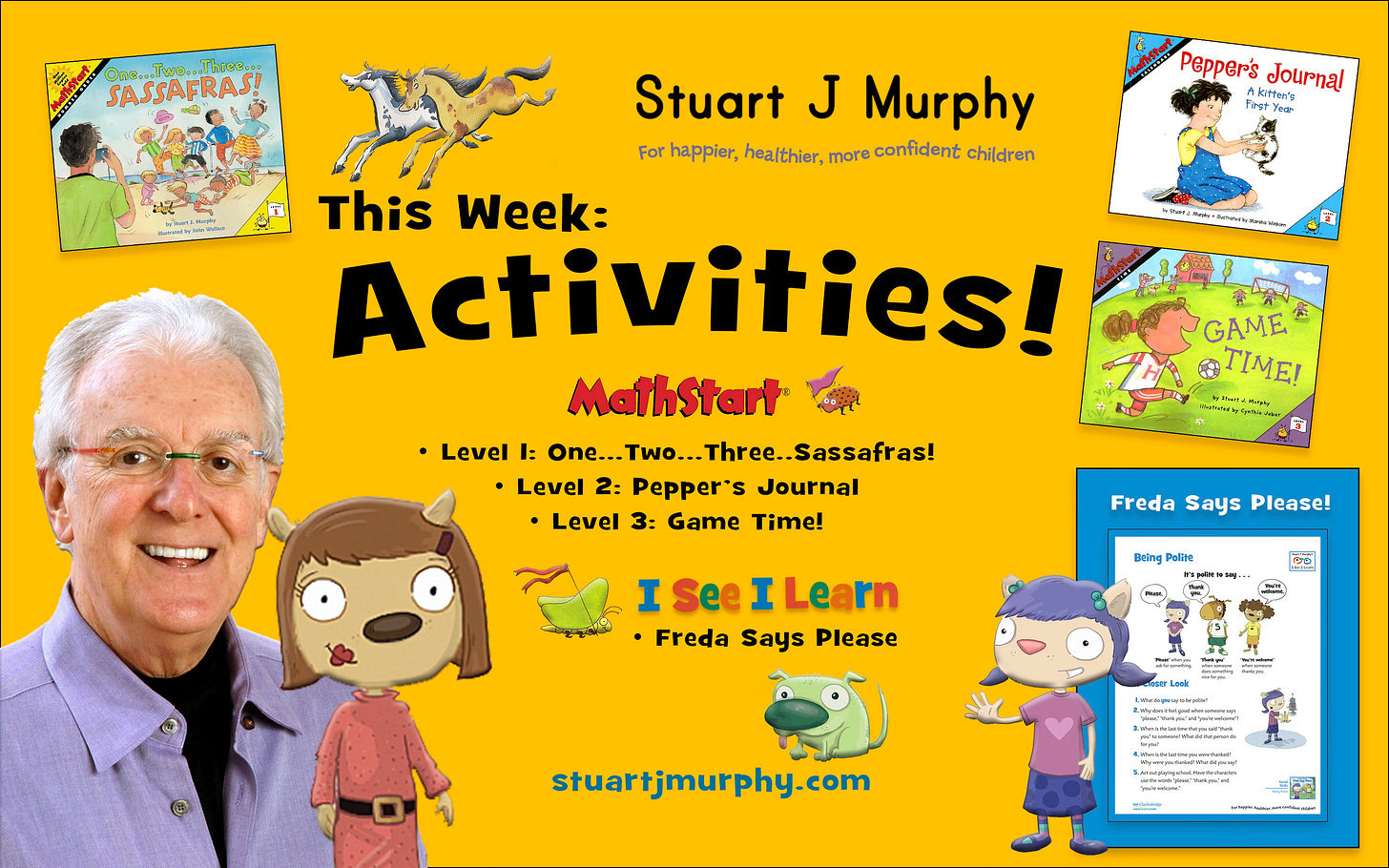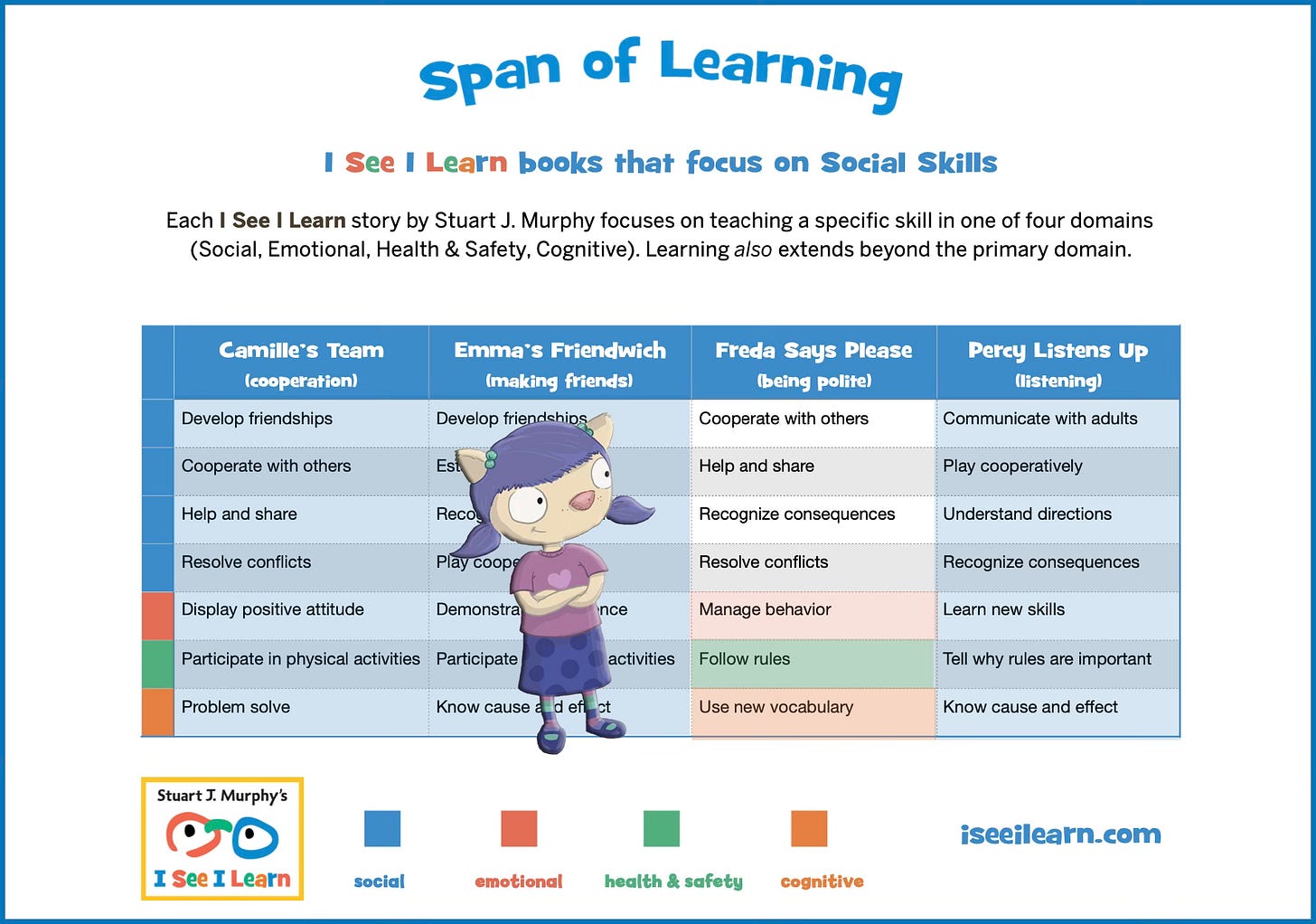Activities! Number Order! Calendars! Game Time! And...Please! Thank you! & You're Welcome!
The Stuart J. Murphy Activities Newsletter comes out every other Wednesday, filled with selections from a vast and wonderful archive of Early Math & Early Childhood Ed activities.
Please tell your friends, colleagues, librarians & parents!
Subscribe today! It’s FREE!
Hello, Everybody!
Can you believe it is already after Labor Day? The school year is in full swing!
But it is still warm enough to go to the beach on weekends. Which is exactly where the Lumpkins decide to go for their family reunion in the MathStart story, One…Two…Three…Sassafras! (number order). The big question: How should they line up for the family photo? By size? By age? Are you the oldest, the youngest, or the “middle-est” in your family? (I am the youngest!)
This week’s other featured MathStart books are:
Pepper’s Journal (calendars)
Game Time! (time)
Freda Says Please (being polite) is our featured I See I Learn story. Making a good first impression is especially important at the start of a new school year. Teachers love students who say “please,” “thank you” and “you’re welcome.” Everybody does! Isn’t it nice when someone asks you for something and says, “Please”? And it feels soooo good to say, “Thank you!”
You’re welcome!
Your friend,
Stuart
Mathstart is a series of 63 storybooks organized into three levels for Pre-K through Grade 4. Each story teaches a different mathematical skill.
You can buy individual books, sets by level, or a complete library. Here is list of where to find MathStart books!
• Level 1, Pre-K/ Kindergarten:
One…Two…Three…Sassafras! (number order)
It's picture-taking at the Lumpkin family reunion and Uncle Howie wants all the cousins to line up by age—from one-year-old Jacob to 15 year-old Tanya. "Say Sassafras!" But when Uncle Howie clicks the shutter, something always seems to go wrong. "Great galloping gillywhoppers!"
Learning to arrange numbers in order helps develop counting skills and prepares children to understand our number system.
• Level 2, Kindergarten / Grade 1:
Pepper’s Journal (calendars)
Grandma's cat Snowy is about to have kittens, and Lisa and her little brother Joey will get to keep one. Little Pepper, whose white fur is dotted with black spots, has a very busy first year. Lisa keeps track of the highlights using a calendar. Her journal is also filled with lots of nifty information about cats.
Events in people's lives are measured by time, so it is important that children understand the relationships between days, weeks, months, and years.
• Level 3, Grades 2 - 4:
Game Time! (Time)
Last year, the Falcons were the soccer league champs. Can the Huskies beat them this year? The big game is only seven days away—just one week. Then it's only one day away—24 hours. Then it's only an hour away—60 minutes. At first the Falcons come on strong, scoring during the first 15-minute quarter. Will the Huskies catch up by the half, 30 minutes into the game? It's a nail-biter, right down to the last second!
The relationships between the various units of time—seconds, minutes, hours, days, and weeks—and how clocks and calendars represent these units are important concepts for children to understand.
TikTok! Instagram! YouTube Shorts!
The embedded video actually isn’t a "Short.” Apparently, you can’t embed shorts on Substack. But the “short” looks just like it, only narrow!
Yes, my friend Janet and I are experimenting with the short form social content. So far only dipping our toes in the digital water. Advice, tips and feedback welcome! Are you on any of these channels? Would you like us to follow you? Click here to send a note!
• TikTok: @SJM72321
• Instagram: @stuartjmurphy
• YouTube: @StuartjmurphyAuthor
I See I Learn is a series of 16 stories that follow the adventures of the children in Miss Cathy’s class at Ready, Set Pre-K in See-and-Learn City (see map).
Each story focuses on a different social, emotional, health & safety and cognitive skill important for success in school and in life. For Pre-K / Kindergarten.
20% off on book sets on the I See I Learn store!
Freda Says Please (being polite)
Freda likes to play school. But when she pretends to be the teacher, she doesn’t always say “please” and “thank you.” See how her friends help Freda learn how to be polite.
Saying “please,” “thank you” and “you’re welcome” shows respect for others and demonstrates appreciation for kind behavior.
Thank you for reading my book!
FREE PDF POSTER!
Do you have a story or a question? Please send me an email!








